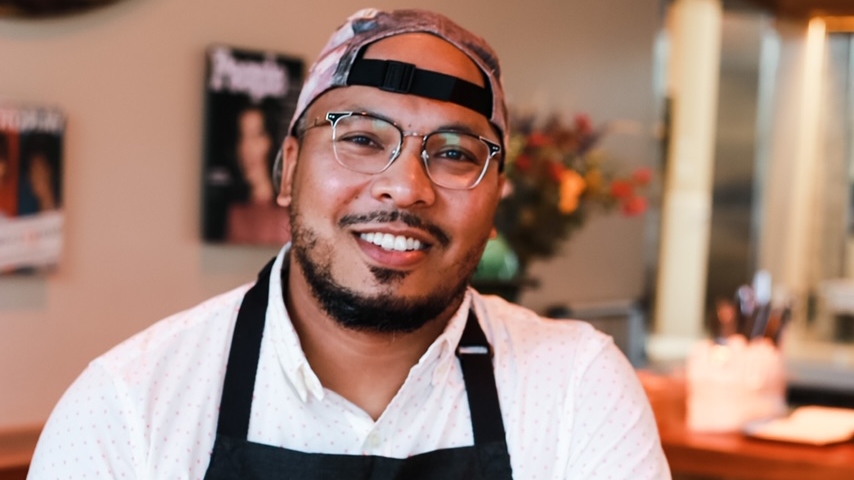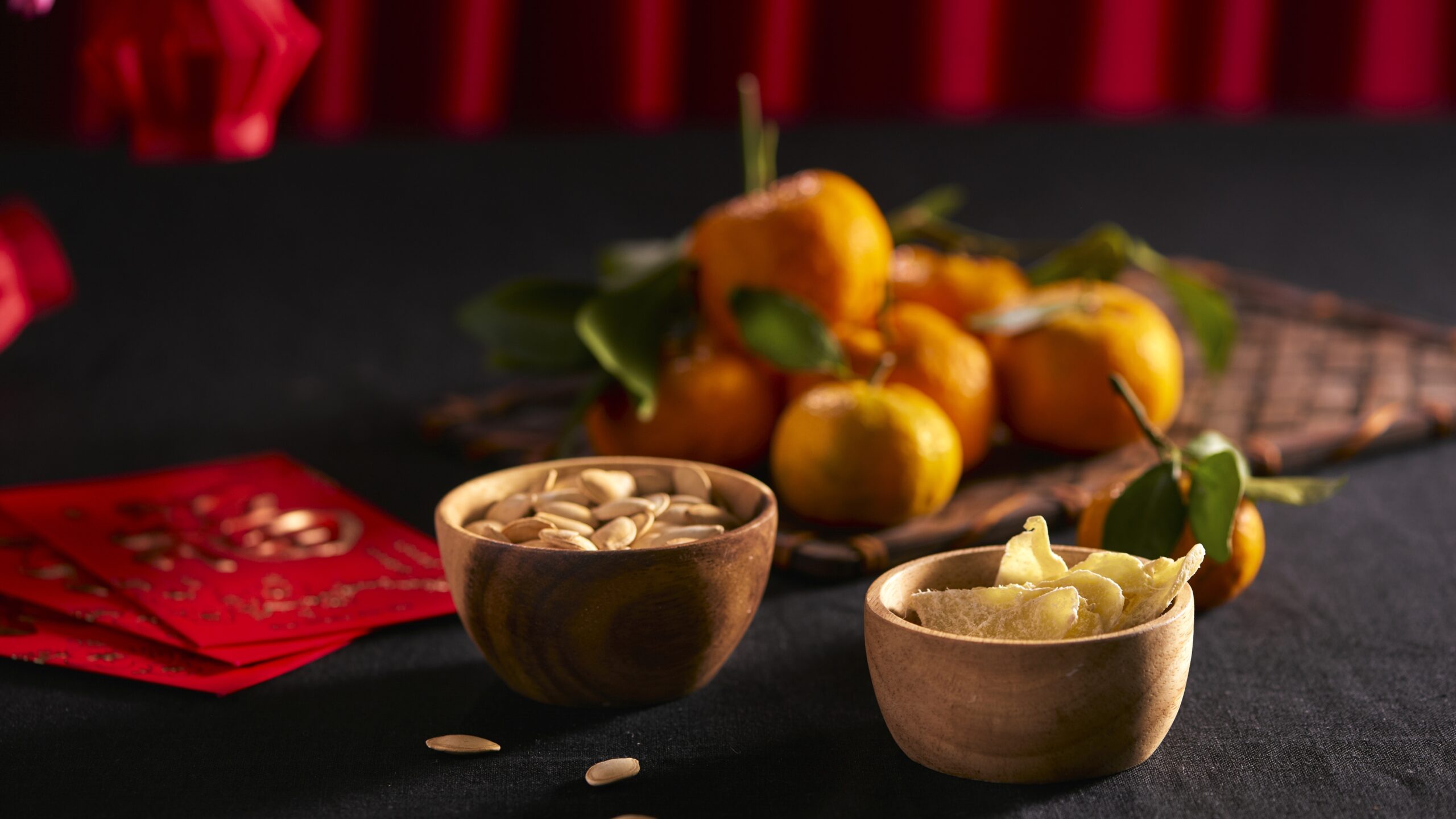It’s the Year of the Tiger: Do you know what—and who—the Lunar New Year is all about?
Celebrated Chef Jerome Grant shares his insights about the holiday celebrated by billions of Asians around the world—including those of Black and Asian descent.
“I want people to know it’s more than red envelopes,” said Chef Jerome Grant when asked about the traditions and meanings surrounding the Lunar New Year, which kicks off today, January 31. Chef Jerome may be best known for his James Beard Award-nominated work as the inaugural chef of Sweet Home Café at the National Museum of African American History and Culture—and co-author of its equally acclaimed cookbook. But as Grant spoke with theGrio, it was hard not to also consider him a living amalgamation of the much-touted American Dream.

“My mother’s Filipino—I was born in the Philippines—and my father’s Jamaican. My stepfather’s a country boy from Hampton, Virginia. So I’ve honestly been privileged to live a life blessed with a lot of culture, a lot of amazing things, and to live in this body that I was given,” Grant shared, chuckling as he added: “You know, I’m a Black guy with Asian features. I had two types of lunches when I went to school. Kids made fun of me because sometimes it stunk.”
“I wasn’t a kid that was born in America, but my life has been based in America,” he continued. “I grew up with a Filipino mother. I had her traditions, and my biological father, my stepfather, I have their traditions. So our American table was different—it was different from yours—but who’s to say it wasn’t American?
Now, Grant is the celebrated chef and proprietor of two successful restaurants in the Washington, D.C. area (Jackie and Dacha Beer Garden). He is also a married father of three and his wife is Chinese, making the Lunar New Year a celebration he knows well—as well as its culinary traditions. But while most are familiar with Chinese New Year, celebrated for a full 15 days, and those ubiquitous red envelopes (there’s even an emoji for them? ), too often the holiday is associated solely with the Chinese. In fact, there are Asians throughout the diaspora—including Korea, the Philippines, Taiwan, Malaysia, Singapore, Indonesia, and yes, here in America—who will be celebrating the Lunar New Year this evening as the Year of the Tiger begins. And yes, that includes Black Asians like Chef Jerome, too.
“We celebrate Lunar New Year every year…and actually sharing it with my kids now, we’ve made it a big deal, ” Grant shared, explaining: “My wife’s family is very, very big on Lunar New Year…and so, we really go all out. We roast a whole pig. My (three-year-old) daughter loves cooking with me…but growing up, you know, my wife with her parents and her mother and her aunt, [were] in the kitchen making dumplings because that was tradition. So, we get to pass those things on…And it’s super amazing to be able to do it with my family; to see the crossover from things that my mother always did and to educate my children about it,” he continued. “It’s just this awesome tradition for us that we really enjoy and we try to keep it as traditional as possible but include our own traditions along with it, which is the additional fun part of it.”

Grant is no stranger to honoring tradition; his launch of Sweet Home Café required extensive research into African American culinary origins and traditions. Drawing parallels and intersections between what we now lovingly consider “soul food” and Lunar New Year traditions, he noted: “It’s the connection of the feast…earlier this year, we were cooking black-eyed peas with pig tails and collard greens and Carolina rice. That’s what we were doing, but it was a family together—you know, almost a reunion-style meal. Plenty of things on the table, plenty of food in abundance, but spending that time together, most importantly, and looking forward to the new year.”
Much like those aforementioned foods many African Americans prepare and eat to mark the new year, Grant pointed out that Lunar New Year celebrations also “have these foods on the table that symbolize luck and wealth and happiness…and that’s where I feel the true connection is: the way the connection starts with family and friends—and the celebratory meal.”
Of course, while the foods and holidays may share much of the same significance, each culture’s New Year’s meal is distinct in its offerings. “Whatever culture it is—even if you look at Filipino-style New Year’s and Chinese-style New Year’s—my wife, her side always has whole animals on the table, so you’ll see whole ducks, whole pigs, whole fish…versus Filipino New Year, they kind of avoid fish and chicken, but they’ll have everything else as far as paying homage to whole animals and stuff like that,” Grant explained. “They have those things that are separate, but there’s always noodles there…There’s always some kind of sticky food—glutinous rice, some kind of steamed rice, or steamed dumpling of some sort—those are two things that both cultures share…and then, the additional superstitions and stuff like that.”
At least one (if not more) of those superstitions will sound very familiar to those who also subscribe to Southern African American New Year’s lore: “Make sure your house is clean before the before the party—but don’t sweep the floors,” Grant noted, explaining that you don’t want to risk sweeping out either luck or money. However, for the Lunar New Year, hosts are encouraged to open all the windows to let in good luck. Those firecrackers? The noises will hopefully scare off any bad spirits or energy—but not the noise of kids whining or crying, “so my mother’s there to spoil them,” he chuckled.
And then, there are the red envelopes. “There’s always money given,” said Grant. “The kids always have money in their pocket—you know, the sign of wealth. They get the red envelopes, and my mother makes sure she gives them ten bucks, not five bucks. Whole numbers [only].
“You know, it’s all the those types of things…but it always starts off with family and making sure that family is taken care of and spending the time. You’re going into the new year together, and you’re doing that happy and wealthy and with great promise,” Grant added.
The still-rising chef told us that’s the story he would most like non-Asians to know about this oft-misunderstood holiday. “I would like them to know a lot about the tradition—like, it’s just not a celebration [where] you show up at somebody’s house and they give you these red envelopes and it’s a big party. All these things are done for a reason. There are great stories behind it; great traditions behind it. So, understand the stories; share the traditions.”

Maiysha Kai is Lifestyle Editor of theGrio, covering all things Black and beautiful. Her work is informed by two decades’ experience in the fashion and entertainment industries, a love of great books and aesthetics, and the indomitable brilliance of Black culture. She is also the editor of the YA book Words of Change: Body, due out February 1.
Have you subscribed to theGrio podcasts “Dear Culture” or “Acting Up?”
TheGrio is available for FREE wherever you use the internet — on our new mobile App, Roku, Amazon Fire TV, and AppleTV! And a Black Podcast Network coming soon!
More About:Lifestyle Culture Watch



